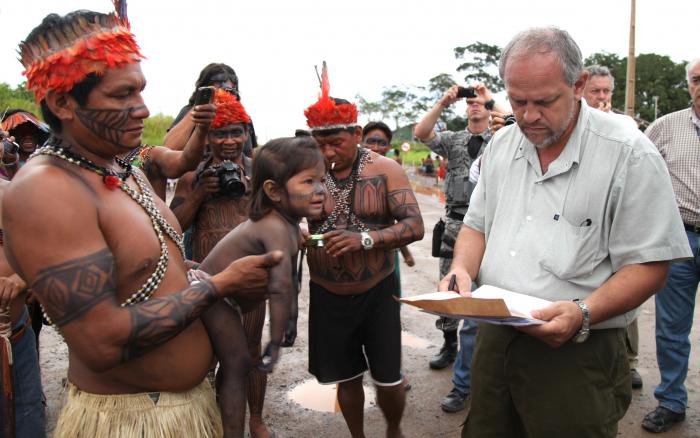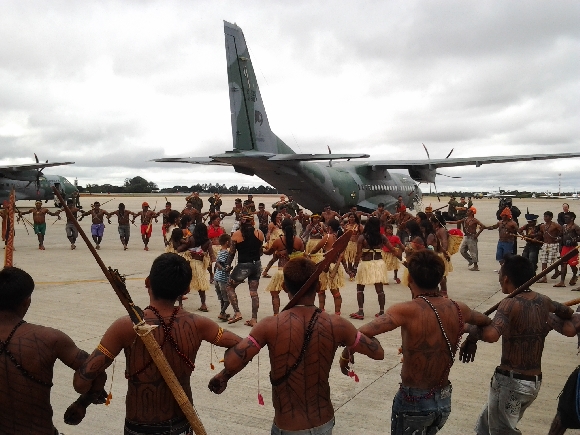Update from the Amazon: Indigenous Protestors Arrive in Brasília to Demand Rights

Two Air Force planes carrying aboard some 140 indigenous representatives of the Munduruku, Xipaya, Xicrin/Kayapó and other tribes participating in the latest occupation of the Belo Monte dam site just arrived in Brasilia for a meeting with Minister Gilberto Carvalho, General Secretary to President Dilma. Given the Rousseff administration's systematic violations of indigenous rights - especially the right to free, prior and informed consultation and consent - in the planning and licensing of mega-dam projects in the Tapajós and Xingu river basins, as well as recent attempts to de-legitimize and intimidate Munduruku leaders (including the use of armed forces) the meeting is expected to be tense. See below a letter issued this morning by indigenous leaders at the Belo Monte dam site, as they prepared to board the Air Force planes heading for the nation's capital. We'll keep you posted on the outcome of the meeting.
Letter No. 9: Tragedies and Dams (the struggle does not end there nor here)
We have left our occupation of the Belo Monte dam and have come to dialogue with the government.
We have not come to an agreement with you. We accept this meeting in Brasilia because the more we said we would not leave, the more you sent police to the work camp. And on the same day that we were to be removed by force by the police, you killed a one of our relatives, a Terena in Mato Grosso do Sul. Therefore we decided that we did not want another death. We avoided a tragedy, not you. You do not prevent tragedies, you commit them.
We came here to speak to you of another tragedy that we will fight to prevent: the loss of our territory and our life. We did not come to negotiate with you, because one cannot negotiate with territory nor life. We are against the construction of dams that kill indigenous land, because they kill culture when they kill fish and drown the land. This kills us without needing a weapon. You continue killing a lot, simply a lot. You have killed too much, for 513 years.
We did not come to talk only about dams on the Tapajós, as you are telling the press. We came to Brasilia to demand the suspension of feasibility studies and the construction of dams on the Xingu, Tapajós, and Teles Pires Rivers. You are not only talking with the Mundurukú people. You are talking with Xipaya, Kayapó, Arara, Tupinambás, and with all the people who are together in this struggle, because this is a major struggle of us all.
We did not bring wish lists. We are against dams. We demand the federal government's commitment to consult us and ensure our right to veto projects that destroy us.
But no. You trample everything and do what they [the dam building companies] want. And to achieve that you do everything to divide indigenous peoples. We came here to tell you to stop, because we will resist together and stand united. We have been gathered for 35 days in Altamira, and for 17 days we occupied the main hydroelectric dam that you are building. Along with this letter we are sending all the letters from the two occupations that we carried out. Read everything carefully to understand our movement. And in so doing respect us, as you have not done up until today.
Disrespect does not come only from words. It is demonstrated by your actions.
In the region of the Xingu River’s Big Bend, everything is being destroyed and has been turned upside down since you approved the construction of the Belo Monte dam. Everyone very sad and only the rich are doing well. Our indigenous relatives have fought a lot. Even the construction workers suffer.
On the Teles Pires and Tapajós Rivers, you are beginning this process now, but have already gravely disrespected us.
In August 2012, your researchers began to invade our lands, capture our animals and plants, count hectares, measure the water, and drill our land.
In October, [the indigenous agency] FUNAI and Eletrobras said in the meeting that the dams would be built in any circumstance, whether or not we want them. And that they would send the police force to our land if necessary.
In November, the federal police attacked and destroyed the Teles Pires village, where we are all against dams. Adenilson Mundurukú was killed, shot three times, and another 19 indigenous people were wounded. At the end of the month we went to Brasilia denounce the police operation to the Ministry of Justice, FUNAI and the General Secretariat of the Presidency. We also went to prosecutors from the Federal Pubic Ministry.
In January 2013, we held a large assembly in the Mundurukú village of Sai Cinza, where a document with 33 demands was delivered to a representative of the General Secretariat of the Presidency.
The following month, we returned to Brasilia demand a response from the General Secretariat on these 33 points. We managed to find the minister, but he ignored our demands and tried to get us to sign a document accepting dams on the Tapajós River.
To ensure that environmental impact studies of these dams were carried out, the government issued a decree in March 2013 authorizing the entry of police troops on our land. On the following day our villages were raided by police squads.
On the Teles Pires River, the ancient bones of our relatives were unearthed. You are destroying a sacred place.
We could not accept this situation anymore. For this reason we occupied your work camp, bringing our claims, demanding the government's commitment to respect the original peoples of this country, to respect our right to land and to life. Or, at least for the government to respect its own law: the Constitution and the international treaties you sign. Yet you want to destroy the laws that protect us, indigenous peoples, with other laws and new decrees. You want to legalize destruction.
And now we come here to you. Hoping that you finally listen to us, rather than listening to those who pay for your political campaigns. Even if you are not willing to learn to listen, we are willing to teach.




